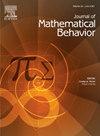Enhancing mathematical instruction for emergent bilinguals through collaborative situated professional development
IF 1.7
Q3 EDUCATION & EDUCATIONAL RESEARCH
引用次数: 0
Abstract
This study investigates the shifts in high school mathematics teachers’ instructional practices when working with emergent bilinguals (EBs) after participating in a collaborative situated professional development (CSPD) program alongside researchers. Over the course of one academic year, the teachers engaged in co-planning, co-teaching, and co-reflecting sessions with the research team while integrating research-based strategies to support EBs in learning mathematics. The CSPD also emphasized implementing cognitively demanding and contextually relevant mathematical tasks. The results reveal that the teachers’ instructional practices significantly improved after participation in the CSPD. These improvements include a stronger ability to maintain the cognitive demand of tasks throughout lessons, an increased focus on creating opportunities for students to articulate and explain their mathematical reasoning, and more effective incorporation of meaningful visual aids that enhance comprehension for EBs. These shifts highlight the potential of CSPD to positively impact mathematics instruction for linguistically diverse classrooms.
透过合作情境下的专业发展,加强对新兴双语者的数学教学
本研究调查了高中数学教师在与研究人员一起参与协作式专业发展(CSPD)项目后,与新兴双语者(EBs)合作时教学实践的变化。在一个学年的过程中,教师与研究团队共同规划,共同教学和共同反思会议,同时整合基于研究的策略来支持EBs学习数学。CSPD还强调实施认知要求和上下文相关的数学任务。结果显示,参与CSPD后,教师的教学实践有显著提高。这些改进包括在整个课程中保持任务认知需求的能力更强,更加注重为学生创造机会来表达和解释他们的数学推理,以及更有效地结合有意义的视觉辅助来提高对EBs的理解。这些转变突出了CSPD对语言多样化教室的数学教学产生积极影响的潜力。
本文章由计算机程序翻译,如有差异,请以英文原文为准。
求助全文
约1分钟内获得全文
求助全文
来源期刊

Journal of Mathematical Behavior
EDUCATION & EDUCATIONAL RESEARCH-
CiteScore
2.70
自引率
17.60%
发文量
69
期刊介绍:
The Journal of Mathematical Behavior solicits original research on the learning and teaching of mathematics. We are interested especially in basic research, research that aims to clarify, in detail and depth, how mathematical ideas develop in learners. Over three decades, our experience confirms a founding premise of this journal: that mathematical thinking, hence mathematics learning as a social enterprise, is special. It is special because mathematics is special, both logically and psychologically. Logically, through the way that mathematical ideas and methods have been built, refined and organized for centuries across a range of cultures; and psychologically, through the variety of ways people today, in many walks of life, make sense of mathematics, develop it, make it their own.
 求助内容:
求助内容: 应助结果提醒方式:
应助结果提醒方式:


